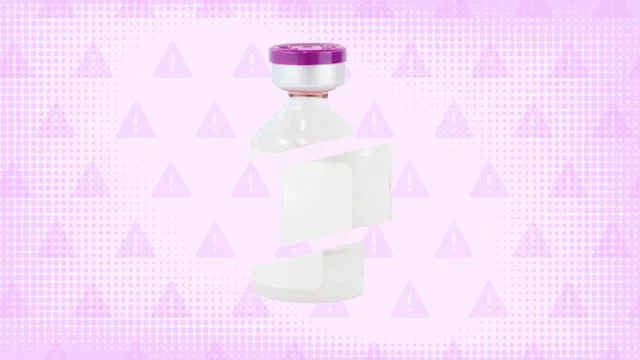Key takeaways:
A weird taste in your mouth can affect your appetite and quality of life, especially if it lingers for a while.
Some medications, such as antibiotics, can cause a sour or metallic taste in your mouth. Stimulants, such as Adderall (amphetamine salts) and Vyvanse (lisdexamfetamine), can leave a bitter taste.
Switching medications, drinking plenty of fluids, and chewing sugar-free gum are a few strategies that may lessen a weird taste in your mouth.
Save on related medications
The flavors we savor add a sense of joy and comfort to our lives. These experiences come courtesy of the taste buds in our mouth, tongue, and throat.
Through sensory nerves, our taste buds communicate information about tastes to the brain. If this process is interrupted, it may lead to taste loss or a strange taste in your mouth.
If you’ve ever experienced a weird taste in your mouth, it’s normal to wonder if any medications you’re taking could be the culprit. The same goes for any health conditions you may have. An unpleasant taste in your mouth or a lack of taste can impact your appetite and quality of life.
Search and compare options
Which medicines can cause a weird taste in your mouth?
Different medications can affect our sense of taste in a variety of ways. While some may lead to a bitter taste in the mouth, others may promote a more metallic or sour taste.
Let’s dive into medications and other things that may cause a weird taste in your mouth — broken down by four distinct tastes they may cause.
1. A bitter taste or dry mouth
Stimulants that treat attention-deficit hyperactivity disorder (ADHD) may cause a bitter taste and dry mouth. Some of these stimulants include:
Adderall (amphetamine salts)
Vyvanse (lisdexamfetamine)
Concerta (methylphenidate ER)
Ritalin (methylphenidate)
Adderall, in particular, can cause oral changes. People sometimes refer to these changes as “Adderall tongue.” Xerostomia (dry mouth) is the likely culprit. When your mouth is dry, there is less saliva. So it can actually cause foods to taste more bitter.
A variety of other medications that can cause dry mouth, too, including:
Antihistamines such as diphenhydramine (Benadryl)
Antidepressants such as sertraline (Zoloft)
Opioids such as oxycodone / acetaminophen (Percocet)
Benzodiazepines such as alprazolam (Xanax)
Is your medication not suiting your taste? Try out these pro tips to make your medication taste better.
Medications can impact more than just your sense of taste: Read on to discover other mouth-related side effects.
Don’t let taste changes take over: Help reclaim control of your oral wellbeing by learning how to combat ageusia (taste loss).
Some dietary supplements can also promote a bitter taste, such as vitamin A, vitamin B, and vitamin D. On the other hand, a lack of vitamins in your system may also increase the risk of taste changes.
2. A metallic or sour taste
Other medications can leave a metallic or sour taste in your mouth. Certain antibiotics that treat bacterial infections are top examples, including:
Penicillins such as amoxicillin and amoxicillin / clavulanate (Augmentin)
Cephalosporins such as cefazolin and cephalexin
Clarithromycin
Metronidazole (Flagyl)
Research suggests that antibiotics like these may lower the absorption of zinc in your body. Your taste buds need this mineral to do their job optimally.
Chemotherapy, a type of medication that treats cancer, is also known to cause a metallic taste. This happens because of the way chemotherapy works. Although it's designed to damage cancer cells, it can also damage healthy cells (including taste buds). Although more research is needed, some studies suggest treatment with zinc or delta-9-tetrahydrocannabinol (THC) might help with taste changes during chemotherapy.
Other medications associated with a metallic taste include:
Allopurinol (Zyloprim)
Baclofen (Fleqsuvy, Lyvispah)
Flurazepam
Lithium (Lithobid)
Phenytoin (Dilantin, Phenytek)
Good to know: One of the most commonly reported side effects of the COVID-19 treatment Paxlovid (nirmatrelvir / ritonavir) is a metallic or bad taste in the mouth. It’s commonly referred to as “Paxlovid mouth.” COVID itself can also cause changes in your sense of taste and smell.
3. Persistent weird taste in the mouth
Blood pressure medications called angiotensin-converting enzyme (ACE) inhibitors can cause a persistent weird taste in the mouth, also called dysgeusia. Like the antibiotics mentioned earlier, these medications are also thought to disrupt taste by causing zinc deficiency (low zinc levels). Enalapril (Vasotec, Epaned), captopril, and lisinopril (Zestril, Qbrelis) are common ACE inhibitors.
Certain cancer medications may have this effect, too, including cetuximab (Erbitux) and imatinib (Gleevec).
4. A diminished taste or lack of taste
Some medications reduce our ability to taste things (hypogeusia). Others may cause us to lose our sense of taste altogether (ageusia).
Isotretinoin (Claravis, Accutane) is one example. It’s used to treat severe acne. You may notice that it’s harder to taste foods while taking this medication. Experts believe isotretinoin lowers people’s ability to smell. Taste and smell have a strong link. If it’s harder for you to smell food, you’re likely to have trouble tasting it, too.
Medications that treat heart disease can also lower your ability to taste. Diltiazem (Cardizem), hydrochlorothiazide, and spironolactone (Aldactone, CaroSpir) are a few examples.
There are other medications that can impair your sense of taste, as well, including:
Carbamazepine (Tegretol, Equetro)
Levodopa (part of Sinemet)
Dicyclomine (Bentyl)
Methimazole
I’m not taking any medications, so why do I have a weird taste in my mouth?
If you’re not taking any medications, you might have a medical condition that’s causing a weird taste in your mouth.
Health conditions, treatments, or lifestyle considerations such as these have been linked to taste changes in certain cases:
Cancer
Upper respiratory infections
Allergies
Sinus infections
Problems with your teeth or gums
Ear, nose, or throat surgery
Autoimmune disorders such as Sjögren’s disease (dry eyes and mouth)
Tobacco use
Contact with insecticides
Liver problems
Vitamin or mineral deficiencies related to B12 or zinc
Neurological conditions such as Parkinson’s disease, head injury, or multiple sclerosis
Hypothyroidism (low thyroid hormones)
Advanced age
Contact your healthcare professional so they can help you figure out what might be causing a weird taste in your mouth.
Is a weird taste in your mouth a symptom of COVID?
Possibly, yes. Many people who test positive for COVID lose their sense of taste and smell. Typically, these changes happen together. And they may occur before other symptoms of COVID start.
One study found that about 60% of people with COVID reported a loss of taste or smell. Researchers have also found that COVID could affect chemesthesis, which refers to our ability to identify chemicals in herbs or spices. These chemicals help us know when foods taste like they are burning, cooling, or tingling.
However, some data suggests that these symptoms have become less common with newer variants compared to the original strain and earlier variants.
How do you get rid of a weird taste in your mouth?
If your medications are altering your sense of taste, your symptoms will likely resolve after you finish taking your medication. Medications very rarely cause permanent taste changes. And if your healthcare professional determines that a health condition is causing the weird taste in your mouth, treating the condition will often resolve the problem as a secondhand benefit.
Otherwise, here are some taste management strategies you can try:
Chew sugar-free gum.
Prepare foods with spices to add flavor.
Drink plenty of fluids.
Brush or scrape your tongue. Brush your teeth regularly, too.
Avoid smoking.
Check with your healthcare professional about trying a zinc supplement.
Check with a healthcare professional if a weird taste in your mouth won’t go away or is really bothering you. Together with your healthcare team, you can pinpoint the likely cause(s) of your taste changes.
It’s also a good idea to keep a current medication list handy. Your pharmacist can check to see if any medications or supplements you take could be causing or contributing to the issue.
Frequently asked questions
Deficiencies in certain vitamins and minerals can lead to an altered sense of taste. This is because they help your body interpret certain signals that are sent to the brain from the mouth and tongue. Examples of these include vitamin B12, vitamin C, and zinc.
Yes, pregnancy changes the way your body works in a number of ways — including an altered sense of taste. How this happens isn’t entirely understood, but it’s thought that changing hormone levels play a role. These changes are most common during the first trimester.
Yes, stomach problems can lead to a bad taste. This is a known symptom of conditions such as gastroparesis (slow digestion) and acid reflux. In fact, more serious gut symptoms increase the likelihood of experiencing taste disturbances.
There are various organs that can lead to a bad taste in the mouth. There isn’t just one organ that does this. Issues with your head, mouth, or even digestive organs like the liver can affect your sense of taste and make things seem off.
Deficiencies in certain vitamins and minerals can lead to an altered sense of taste. This is because they help your body interpret certain signals that are sent to the brain from the mouth and tongue. Examples of these include vitamin B12, vitamin C, and zinc.
Yes, pregnancy changes the way your body works in a number of ways — including an altered sense of taste. How this happens isn’t entirely understood, but it’s thought that changing hormone levels play a role. These changes are most common during the first trimester.
Yes, stomach problems can lead to a bad taste. This is a known symptom of conditions such as gastroparesis (slow digestion) and acid reflux. In fact, more serious gut symptoms increase the likelihood of experiencing taste disturbances.
There are various organs that can lead to a bad taste in the mouth. There isn’t just one organ that does this. Issues with your head, mouth, or even digestive organs like the liver can affect your sense of taste and make things seem off.
The bottom line
Adderall (amphetamine salts), Paxlovid (nirmatrelvir / ritonavir), and metformin are a few medications that may cause a weird taste in your mouth. Dietary supplements and chemotherapy can do this too. What’s more, health conditions such as gastroesophageal reflux disease (GERD) and diabetes may also contribute. Drinking fluids and brushing your tongue are a couple of strategies that can help alleviate the weird taste in your mouth. Reach out to a healthcare professional to learn whether a health condition or a medication you’re taking might be causing your taste changes.

Why trust our experts?



References
Altin, F., et al. (2020). Olfactory and gustatory abnormalities in COVID-19 cases. European Archives of Oto-Rhino-Laryngology.
American College of Obstetricians and Gynecologists. (2020). What causes morning sickness (nausea and vomiting during pregnancy)?
American Pregnancy Association. (n.d.). Dysgeusia symptoms and remedies.
Choo, P. J., et al. (2022). A retrospective study of drugs associated with xerostomia from the Australian Database of Adverse Event Notifications. International Journal of Pharmacy Practice.
Delompré, T., et al. (2022). Detection of bitterness in vitamins is mediated by the activation of bitter taste receptors. Nutrients.
Ghias, K., et al. (2023). The impact of treatment-induced dysgeusia on the nutritional status of cancer patients. Clinical Nutrition Open Science.
InformedHealth.org. (2023). In brief: How does our sense of taste work? Institute for Quality and Efficiency in Health Care.
Kabadi, A., et al. (2017). Taste and smell disturbances in patients with gastroparesis and gastroesophageal reflux disease. Journal of Neurogastroenterology and Motility.
Kan, Y., et al. (2021). Evaluation of antibiotic-induced taste and smell disorders using the FDA adverse event reporting system database. Scientific Reports.
Kumral, T. L., et al. (2018). Evaluation of the effects of oral isotretinoin on nasal function, taste, and smell. B-ENT.
Martin, D., et al. (2023). Amphetamine. StatPearls.
Mazzoleni, B., et al. (2024). Pharmacological strategies and nutritional supplements for managing dysgeusia among chemotherapy patients: A systematic review. Clinical Nutrition ESPEN.
Mitchell, M. B., et al. (2023). Smell and taste loss associated with COVID-19 infection. The Laryngoscope.
National Institute on Deafness and Other Communication Disorders. (2023). Taste disorders. Nations Institutes of Health.
Parma, V., et al. (2020). More than smell—COVID-19 is associated with severe impairment of smell, taste, and chemesthesis. Chemical Senses.
Schiffman, S. S. (2018). Influence of medications on taste and smell. World Journal of Otorhinolaryngology - Head and Neck Surgery.
Sharetts, R., et al. (2024). Long-term taste and smell outcomes after COVID-19. JAMA Network Open.
Younes, S. (2023). The impact of micronutrients on the sense of taste. Human Nutrition & Metabolism.














